Allison M. Dickson's Blog, page 19
September 1, 2012
Ian Healy Dishes on the The Archmage
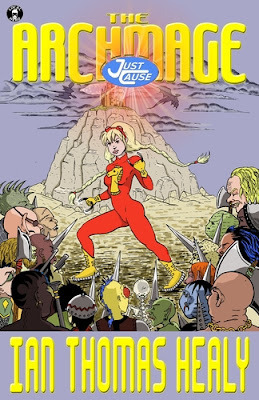
It pleases me to see so many discover the Ian Thomas Healy's Just Cause Universe. Ever since the first book, Just Cause, came out last year, people have been buying it up, and I have a feeling that will only continue with the release of the second book in the series, The Archmage. The books are exciting and fun reads, and they're damn hard to put down once you start reading. I first read it when Healy finished writing it a few years ago, and I immediately fell in love with the different twists and turns the plot takes in this book. There is time travel, magic, and Nikola Tesla, and as we all know, Tesla is win.
I had Ian answer a few questions to tell everyone a little more about this book, the future of the Just Cause series, and his latest venture in starting his own publishing company, Local Hero Press. Afterward, pick yourself up a copy of The Archmage wherever books and ebooks are sold. If you order directly from Local Hero, you can get signed copies in either digital or print! You'll also find purchase links at the bottom of the interview. Ian will be on the 9/6 episode of the Creative Commoners podcast to talk more about the book and his other exploits. Don't forget to tune in!
1. Congratulations on the release of The Archmage! What new things does this next volume in the saga bring to the table?
The Archmage continues the story of Mustang Sally as a still-new-but-not-inexperienced member of the Just Cause superhero team. She's still got some growing up to do--after all, she's still only 18--but her relationships with other members of the team are strengthening and changing. Her relationship with Jason, especially, is going through some growing pains, related to a new member of the team who has some history with him. All this is set against the backdrop of a powerful wizard who is making a play to conquer the entire world, and it seems like not even the might of Just Cause will be enough to stop him. As big as the threat of Destroyer was in Just Cause, the Archmage had to be even bigger and scarier.
2. Without giving away a lot of spoilers, I will say that this book does involve a lot more fantasy and magical elements than the other stories. What was your main reason behind going in this direction? Are there other stories that inspired you?
I spent a lot of time in my teens and twenties playing tabletop roleplaying games, and I always had a lot of distaste for certain types of games and characters. I wasn't ever a huge fan of fantasy games, and magic tended to irritate me. Let's say that The Archmage was my way of dealing with both magic and fantasy in terms that I found comfortable and acceptable. Magic is a huge trope in superhero tales, and characters like DC's Dr. Fate or Marvel's Dr. Strange have been around for decades. I figured that the Just Cause Universe needed its own magic-users, so I expanded upon the idea of Stratocaster. The character of Stratocaster, by the way, was strongly inspired by Alan Dean Foster's Spellsinger series, which is great, goofy fun.
3. Compare the writing experiences between the first book and this one. It's widely known that Just Cause, being the first of the series, went through a lot of changes before it became the book that people are buying now. Did you go through a similar strenuous editorial process with The Archmage? Did you submit it to agents as well?
The Archmage sat half-finished for a much longer period of time than Just Cause had been shelved. I finished the first draft of Just Cause in 2004. I started The Archmage in January of 2005, while I was querying Just Cause. Several months later, when I'd grown discouraged with the veritable shitstorm of rejections, I just flat-out stopped working on The Archmage altogether and moved on to other projects. I honestly don't recall exactly when I picked up The Archmage again to finish it, but I know you were involved in that process, so it had to be at least 2008 or 2009. That's a long time for me to leave any project unfinished. I did query it, but I didn't have much hope for it, as it was Book 2 in a series that the first book hadn't sold.
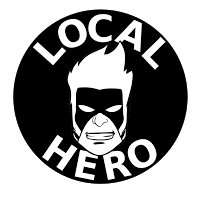
4. Now, some might notice that you've gone through some changes in recent months regarding publishers. You've re-released Just Cause under your own imprint, Local Hero Press, and The Archmage is also under this label. Can you talk a little bit about what led to this decision and what your goals are with Local Hero Press?
Ultimately, Local Hero Press was about me keeping better control over my self-published work by unifying it under a single banner. Just skimming through the variety of novel-length fiction I have available for sale, there is superhero, cyberpunk, fantasy western, urban fantasy, sports fantasy, post-apocalypse, and science fiction. That's a pretty diverse collection, and it provides a lot of avenues for people to discover me. By tying it all together under the LHP emblem, there's a second aspect of consistency besides just my name. Using an imprint also gives me avenues of distribution through CreateSpace that aren't available without it. And finally, should I ever decide to take on the considerable challenge of publishing other authors' work, I would need a company to do that, instead of doing it all under my own name. So let's say that LHP could just as easily stand for Loaded Hot Potential, because there's a lot of potential directions I could take it in the future.
5. Since you're doing all of this on your own now, tell us what all went into the production and promotional aspects of The Archmage? Feel free to break it all down. With bullet points, even!
Well...
I made a commercial for it with the help of Corbin Gill of Two Filmingos Productions, spoofing a DirecTV ad campaign. You can watch it here.
I hosted an ARC giveaway with the help of Jeff Hebert and his HeroMachine graphic character creation app. Three people won that one, with the grand prizewinner getting a signed ARC from me. He lives in Portugal, by the way, so that's the furthest I've ever sent anything.
I also hosted an ARC giveaway on Goodreads, with an amazing 400+ entrants and five winners, three of whom lived in Canada. Whazzap, Canada? *high five*
I've Tweeted and Facebooked a lot about the upcoming release, probably to the point that some people have quietly stopped paying any attention to me. I hope they'll come back someday after reading my work and tell me what they think.
I should have some blog tour posts going up concurrently with this one, and hopefully that will also generate some interest.
6. What would you advise someone who had the chance to sign with a micro-press, as you previously did? Would you suggest they create their own imprint and going about things the way you have with The Archmage?
I don't know if my experience with a micropress was typical, or better, or worse overall than most people's. Considering the amount of work I had to do to promote myself and my work, I don't think I benefited from it overall. Essentially I signed a contract that didn't change anything I would have done without the micropress on board, except that I gave up a portion of my royalties to them. No matter what, my advice to anyone offered a contract is to read it carefully, and have an attorney look over it as well. If a micropress doesn't pay an advance or provide significant marketing support, it's not really worth signing with them, because if you're going to be doing all that work yourself, you may as well reap the benefits yourself.
7. I know The Archmage just came out and everyone needs to have a chance to enjoy its awesomeness, but any chance you can tell us what's coming up next in the Just Cause Universe? What other non-JCU projects are you working on right now?
The next JCU novel is tentatively scheduled for March 2013, called Day of the Destroyer. It's the origin story of Destroyer, and features characters touched upon in the first two JCU novels, like Mustang Sally's mother Pony Girl, John Stone, and Tornado. The story takes place over 21 hours preceding and during the New York City Blackout of 1977. I'm hoping to release one more JCU novel before the end of 2013, although I haven't decided whether it will be one of the ones I've already completed or one which I'm working on now. Ideally, I'd like to release JCU books about every six months. I'm also considering the possibility of putting out a JCU fanfiction anthology at some point, once LHP has enough working capital to be able to pay contributors for their stories.
As far as non-JCU projects, I'm down to two active projects at the moment: Making the Cut, which is a young adult novel set during a televised cooking competition between recent high school graduates, with tuition to a culinary academy as the prize; and Starf*cker, which is a send-up of space opera along the lines of my prior funny books like The Milkman and Blood on the Ice, starring an aging male porn star who has the chance to help a dying alien civilization rekindle their breeding. I have other projects in the pipeline, both completed and on submission, completed and awaiting release, or nowhere near close to finished. It's an addiction, this writing thing. I just can't stop doing it.
Buy The Archmage:
Local Hero Press, Amazon, Barnes & Noble, Kobo, Smashwords
Published on September 01, 2012 20:35
August 22, 2012
@FakeEditor: The Story of a Twitter Legend
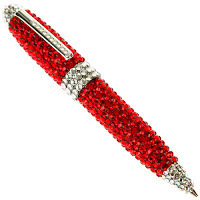
Trademark @FakeEditor Sexy Pen
A lot of people create alter-egos on the infamous Twitter for the same reason people like LARPing or putting on trenchcoats and flashing little old ladies. It's just something to do. My good friend and colleague Ian Healy decided it might be fun if we pretended to be jaded and (eternally drunk) editors at an unnamed publishing house. We called the account @FakeEditor, and with the flourish of a red blingy pen, we sent out our first tweet on April 22nd, 2010.
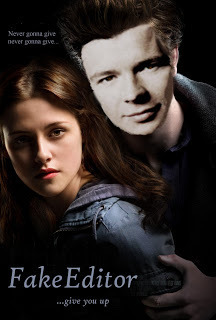
There's no better Rickroll than this in existence
It took a little time to pick up attention, but it was no less fun as we traded back and forth our own little barbs about the industry behind our cynical little guise. Eventually we started gaining steam through holding contests and networking with a lot of authors. @FakeEditor attended the Pikes Peak Writers Conference in 2011 and did good bit of Tweeting, causing a stir by making several people wonder if they were sharing the table with the infamous curmudgeonly drunkard. Eventually we added the "Wise Ass Intern," who would send out Tweets on Wednesday, thereby increasing the multiple personality disorder between the two of us. At various points, we threatened to out ourselves, or we implicated other Twitter personalities, such as @EvilWylie to throw people off our scent. We even decided to post a picture of ourselves, which went over really well with followers.
Over the course of my time under the alias, I passed a couple Tweets with Stephen King's son Joe Hill. At some point, (after my departure), Wil Wheaton even re-tweeted @FakeEditor, and I think by then, Ian and I both agreed that his little idea had finally reached legend status.
I eventually lost the ability to maintain dual personalities, so Ian kept on with it, bringing on the "intern" permanently to share the margaritas and fake drudgery. We have decided not to out this person, but we figured it was time to unmask ourselves. No real reason other than I guess we both agreed it was time. Why the hell not, you know? I'm sure the shenanigans will continue over at @FakeEditor. After two years, the account currently has over 4500 followers, which is several times more than the number of followers Ian and I have combined (and we've both been on Twitter twice as long). It's odd, really. @FakeEditor never interacts much with other users, and we never had a policy to serial follow people or do any of the other things that "experts" say guarantees more followers. Everyone involved just made a point to be as funny and interesting as possible, and I guess that worked out. I think it's all about being raw, unfettered personality.
At any rate, even though I am no longer involved, I highly recommend (especially if you're a writer or editor or agent) to give @FakeEditor a follow. Ian and his current intern (who is as yet unnamed) are damn funny. I might even pop on from time to time to say something, but the beauty is, you'll never really know for sure.
Published on August 22, 2012 19:15
August 16, 2012
I'm a Writer; I'm not a Publisher: An Explanation

This self-publishing thing is hard work!
I've been chewing on this post for awhile, wondering when exactly I would write it. I've been feeling a little weary of self-publishing for a while, but I wasn't sure just how to word it or even if I should. Sometimes it's just best to carry on through dips in enthusiasm and productivity and just trust that they'll resolve themselves. Sometimes they do. Sometimes they just become new insights about yourself that you were putting off making, but can no longer ignore. Sort of like my choice to become a vegan.
But then this morning I got a letter from a good friend and avid Creative Commoners listener. He was listening to the latest episode where I talk a little bit about my recently announced signing with Hobbes End Publishing for my book THE LAST SUPPER, and somewhere in there I talked about how it felt good to be with someone who can handle all of the things that I've been having to handle myself, because I'm just getting tired of it, and that there are people who are better suited to doing such things.
All of this is true, of course. But my friend thought I was throwing self-publishing under the bus after extolling its virtues on various episodes throughout the podcast's history and that any other listeners who were feeling a sense of camaraderie with the show's DIY attitude might have felt a little put off by my words.
So I feel like I need to explain a few things.
First, when I record podcasts, it's usually late at night--around 11pm. By that time, my general attitude on things is a little more of the "ah fuck it" sort, so my choice of words might have been a little looser than if we had been recording in the middle of the morning or afternoon. However, the sentiment I expressed about my gratitude of finally having a publisher who can handle the things I'm tired of handling remains very true, and I don't believe it's much different from things I've expressed in the past. Second, with regard to the podcast, I share the show with two other people who have their own things they'd like to say, so the time I spend on such topics understandably has to be limited. Hence the blog.
Now onto the meat of the topic...
It was never my goal to be the "Wil Wheaton" type when it comes to publishing. And by that I mean someone who takes a principled stand to self-publish because of any perceived flaws or drawbacks in the industry. Of course, there ARE flaws and drawbacks in the industry (I spoke about this at length yesterday). But there there are flaws in every industry and people react to those things differently. It has never been my goal, however, to choose self-publishing in order to eschew the traditional side of things. Never. And I have been quite clear on that. I self-publish for a couple reasons.
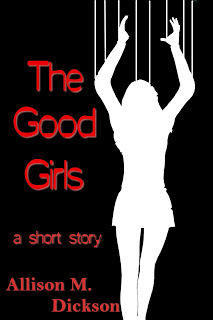
Oh yeah, there's another new story!
Coming Soon to an Ebook Store Near You.
1. I write a lot of short stories. The short story market is small, highly competitive, very slow moving, and it doesn't pay much. Furthermore, the exposure that many of these markets grants authors is limited. I believe many people contribute to them for networking purposes more than anything. They also submit because they want to join author organizations like the Science Fiction Writers of America or Horror Writers Association. Again, perfectly acceptable reasons, but those things aren't as high on my priority list as they used to be. I've published with a few small short story markets, and the benefits have been negligible. My main goal is to have readers read my work, and I don't think it was happening with that method. Granted, I do have two stories releasing in an upcoming anthology, but I still think (and so does the producer of the anthology) that self-publishing short stories is a very good and viable thing. It's also a matter of access for readers. It used to be you had to buy magazines, anthologies, or subscribe to small literary publications to find short stories. Or you had to read them online. The active market on Amazon and other retailers shows a healthy demand for shorts, and now with the advent of e-readers, the access to them has been greater than ever. Occasionally if I feel something has a chance in one of the other markets, I will submit, but most of the time I move my short stories straight onto the e-reader markets when they're done (see the accompanying picture!), and I like that.
2. I never intended for my novels to be self-published. Every novel I write and will write will almost always pass through the traditional market first, whether that's agents, Big 6 publishers, or small-medium press. That's where the exposure is. That's where the money is. That's where you find the people whose number one job is to assemble books and push them out onto the marketplace with all sorts of fanfare. And frankly, they are still the standard bearers for most consumers. When buyers see that a book is self-published, they automatically assume it's not as good. You could put that same book on a Random House listing, and their perception of that book automatically improves. That stigma may be fading a little bit, but it's still a truth most self-published authors don't want to acknowledge, or they do so begrudgingly. Get out there and talk to your average book buyers (the ones who don't know you), and you will see that belief pattern is still very much there.
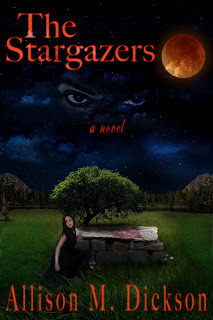
Buy Me! I'm Awesome!
The two novels I have up for sale now all went through the agent channel before they went up for sale on Amazon/Smashwords. I believe I know why these novels were turned down, and it was namely a genre/marketability issue. SCARLET LETTERS is a satire, but it probably isn't satire enough, and the market for such fiction is already very small. THE STARGAZERS is a fantasy, but it is a confused fantasy that doesn't know if it's YA or for adults, which makes it difficult to place in a bookstore. But I didn't want them languishing on my hard drive for eternity. I'm proud of those books and I think they are good, so I decided to put them up for sale to see if readers liked them. For the most part, the reviews have been positive, but the sales have been middling. Why? I don't know. Maybe it's not their cup of tea. The more likely answer is it's damn hard to promote things without help, and also because I've been too damn busy writing. Because I'm a writer.
Meanwhile, after finishing THE LAST SUPPER and getting that deal inked, I've been trying to finish the next book, and it's been a struggle. Not just because it's been difficult settling on what the next book should be, but also because I've had to put a lot of energy into maintaining my self-published stuff so that it doesn't go stagnant. Sales have been down the last few months as my attention has been elsewhere, and that has been disappointing. While I don't ever expect the money from this venture to pay my rent, I would like for it to be a bit more fruitful. But in order to do that, I have to take a lot of time away from my novel writing. I have to "water the garden," as it were, by making sure there is fresh work up there at least semi-regularly. I also have to maintain some semblance of marketing. I also have to make covers and edit and write blogs and package stuff to keep the readers engaged, because obviously I want them to be there when LAST SUPPER finally comes out next year.
I see my more ardent self-publishing colleagues doing all of these things and more in order to create a larger presence. They've established their own imprints. They're doing print layouts, cover design, editing, giveaways, producing their own trailers and other events. They're taking on a staggering amount of work that's usually assumed by a full-time publisher, all while writing. These people are like machines, and I envy them a little, but I have no desire to do what they do. This is one reason why Amanda Hocking, self-publishing queen and Amazon millionaire, ultimately signed with St. Martin's Press, even though it would mean less money for her. Because she too wanted to be strictly a writer and not a publisher. She wanted to throw her books at her editor and go "fix that shit," and then start the next book.
I wish my writer/publisher colleagues the best of luck with their self-publishing endeavors, because clearly they have the patience and the ability to carry on with it (obviously they enjoy it on some level, or they wouldn't be doing it). As for me, I'm hoping that my strategy of devoting more of my energy to my writing so that other people, the ones whose passion it is to find and acquire new talent and to turn that talent into a goldmine, can take notice and turn ME into their goldmine. I normally avoid phrases like this, but there is really no right or wrong way here.
So in the meantime, I consider self-publishing a little "side" thing I do to keep my name somewhat relevant and fresh for readers and primed for when or if a big breakthrough should happen. I always have. This has never been a choice between ideologies for me. It's about pragmatism and shrewdness, about using self-publishing as a springboard rather than a platform or a soapbox.
Published on August 16, 2012 09:38
August 15, 2012
The Business of Writing Is...
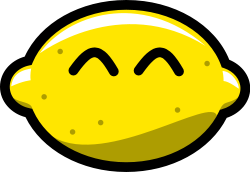
Publishing life can give you lemons. The trick is to always have plenty of sugar on hand...
You got yourself a writing contract! Hooraaaay! Break out the champagne and the confetti and take yourself down to Funkytown on the Kool & the Gang Celebration Good Times Express, because you should be dancin', yeah!
Right?
Well... sort of. But before you glitterbomb yourself and put on your boogie shoes, I want to say a few things to help put this whole next level in your writing career into perspective.
Writing is a creative and often romantic process. Writing for money, however, is first and foremost a business. Not just for you, but for the people investing in you. This is a truth that, as authors, we really don't want to face, because it involves a lot of surrender and compromise and other businessy things that are boring, annoying and/or difficult to understand. We'd rather create stuff and let the money flow in, but it just doesn't work that way. Even in self-publishing, you have to deal with the business ins and outs of all your books' carriers. Amazon, Barnes & Noble, Smashwords, Apple, etc, all have their fine print, and if you take the time to read it all, you will discover that you are risking a lot, and in the worst case scenario, you could wind up with your account suspended or outright banned for not complying with their Terms of Use, which would put a serious hurting in your earnings potential.
Then you get your contract in the mail from your publisher. It's all unicorns and rainbows for your ego, but the same careful reading of the fine print applies. This is especially true if you don't have an agent (btw, getting an agent also requires a contract, which you also need to pick apart with a fine-toothed comb before you sign). You will find that any contract you receive, whether from an agent or a publisher, has probably been written by lawyers and that legalese barely qualifies as English. In this instance, it is IMPERATIVE that you get a lawyer. And if your publisher or agent is worth a damn, they will also recommend the same.
I am lucky to know several lawyers, and one of them (a very smart lady whom I trust without question in these matters) graciously offered her services to me pro bono. But it's worth a couple hundred bucks to sit down with one to have them explain the language of your deal with you. They will help you understand what it all means. They will underline and circle things that might need clarification. They will give you a much broader sense of what the purpose of a publishing contract actually is. The chief one: the contract is designed to cover their asses as much, if not more, than it covers yours.
However, the contract is designed to be somewhat balanced. It should give you protection if THEY don't fulfill their end of the deal, and it should give THEM protection if you don't fulfill your end. If there are parts of the contract that you don't like, that doesn't necessarily make it a bad contract. It just makes it a contract. That's all part of the risk of signing one. That being said, there are red flags that should tell you if a contract is bad. I won't list them here, but this site is a good start to get a feel for some things you should be aware of and ask about if you encounter them.
But what if your contract is good? You had your lawyer go over everything and your agent (if you have one) assures you that your contract is a great piece of paper that will be dipped in gold and used as a shining example of what all publishing contracts should aspire to be.
Well first, congratulations! Second, don't hold your breath. Okay, I know I know, I'm such a damn cynical killjoy. But bear with me here. I've seen a lot of authors sign a lot of great contracts and still get boned in the end, all in very different ways. One of these authors is a good friend of mine. And though I will not name names to protect the innocent and not so innocent, I can say that this person is pretty good at doing due diligence and it all came crumbling down because the publisher did not live up to their end of the bargain (i.e. pay royalties). And because the publisher is now leaning on another clause in their now breached contract to try to essentially hold my friend's work for ransom, this once "good" contract has been rendered into something not even fit for the wiping of an ass.
All this is to say you should enter into any agreement with a sober and sound mind. You might want that fame and success and feel a shoddy deal that benefits them more than you is the only way to do it, but I implore you to think things through and actually understand what you're signing. Chances are, if your contract is good and the company you're signing with is reputable, things will work out for you. But shit happens. In the worst case, you could owe them money or wind up with an orphaned book, and while this might not seem like such a terrible thing when you're still gung-ho intent on getting a book deal, it becomes something very sad and very frustrating when things don't go as expected.
I'm very grateful that I wound up with my current publisher. They're good people and I feel they will do right by me (if you don't feel that way when you sign the paper, then you really shouldn't be signing it). However, this IS a business, and and it's important to keep yourself in a business frame of mind and recognize that there are risks and that things could all fall apart at any moment for any number of reasons, and you could wind up in a lawsuit for unpaid monies or fighting to get your rights back before it's all said and done.
So sure, go out and celebrate your new success and treasure the accomplishment that someone found your work worthy of putting their name and money on the line to publish. But realize that this is not the time to shrug off all the responsibilities that go along with that. You're in a whole new arena now. Things just got a lot more complicated. After you sign a contract, it's more important than ever to look out for yourself.
Published on August 15, 2012 09:05
August 5, 2012
Super Creamy Vegan/GF Corn Chowder
People think that vegan cooking is a compromise to "better" cooking and "better" food. I don't know what to say to that other than you're so very wrong. The food I make is always a celebration of whole ingredients, and it's no different when I take the animal products out of the equation. Food that is sourced and prepared well tastes awesome. And to my astonishment, I've found that great food doesn't require nearly as much oil and salt and sugar as I used to think it did, and that's been a considerable load off my shoulders (and ass).
I love corn chowder. It's sort of the Midwest's answer to the coastal clam chowders (which I also love, but will probably not be able to make vegan no matter how hard I try). My mom asks me to make it for her all the time, and my family loves it too. However, my original recipe had all sorts of dairy and flour and chicken (both the meat and the broth) in it, and that wasn't going to work anymore. But I knew when my parents gifted me with two dozen ears of beautiful locally grown white corn that chowder was going to be on the menu, and it was going to be a great opportunity for me to experiment with some of my new vegan-fu in the kitchen.
There are lots of great alternatives to thickening things and making them creamy without having to add any dairy (or even alternative dairy, which to me is only borderline acceptable... I can stretch a half-gallon of almond or flax milk for nearly a month, that's how little I use the stuff). However, WHOLE nuts are a whole other issue. Cashews, in particular. They blend into a smooth and creamy consistency that is perfect for a lot of applications. If you're allergic to nuts, tahini (sesame seed paste sold in a lot of international markets and some grocery stores) might be a good substitute. If you don't want to add ANY nuts or seeds to this recipe, that's okay too. I think with the puree of the corn and the potatoes and cauliflower, you'll still get a great consistency. And since I didn't have to use any flour as a thickener, I believe this is also a win for the gluten-free crowd. So hooray for that!
Bottom line, even if you're not a vegan and are a sworn up and down carnivore and dairy fiend, you will love this soup.
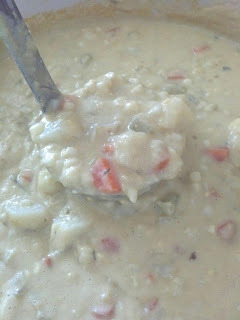
Allison's Super Creamy Vegan Corn Chowder
This recipe makes a LOT of soup (it nearly fills my 8.5 qt pot). If you need less soup or aren't into freezing it, cut this recipe in half.
2 tbsp extra virgin olive oil
1 large onion, diced
4-6 small carrots, diced
4-6 stalks of celery (greens included, if possible), diced
2 bay leaves
2 tsp fresh thyme
4lb bag of russet potatoes, peeled and diced
1 head cauliflower, cut small
8 cups of fresh or frozen sweet corn, divided
2 quarts vegetable stock
1 cup raw, unsalted cashews
1/4 cup nutritional yeast (when combined with the cashews, it adds a great nutty/cheesy flavor, but you if you don't have it, you don't have to add it)
salt and pepper to taste
Heat olive oil in heavy bottomed soup pot or Dutch oven over medium-high heat. Add onion, carrot, celery, bay leaves, and thyme and cook until softened, about 5-8 minutes. Add the potatoes, cauliflower, 6 cups of the corn, and vegetable stock and bring to a boil. Reduce heat and simmer until the potatoes and other veggies are soft, about 45 minutes.
Meanwhile, add the remaining two cups of corn, the cashews, and the nutritional yeast to a blender. Ladle in as much of the cooked soup and broth as your blender can comfortably hold. Be very careful when blending hot liquids. I will usually hold a towel over the opening when doing so. Blend until smooth and creamy and add back to the pot. Adjust seasoning and serve with your favorite crusty bread.
I love corn chowder. It's sort of the Midwest's answer to the coastal clam chowders (which I also love, but will probably not be able to make vegan no matter how hard I try). My mom asks me to make it for her all the time, and my family loves it too. However, my original recipe had all sorts of dairy and flour and chicken (both the meat and the broth) in it, and that wasn't going to work anymore. But I knew when my parents gifted me with two dozen ears of beautiful locally grown white corn that chowder was going to be on the menu, and it was going to be a great opportunity for me to experiment with some of my new vegan-fu in the kitchen.
There are lots of great alternatives to thickening things and making them creamy without having to add any dairy (or even alternative dairy, which to me is only borderline acceptable... I can stretch a half-gallon of almond or flax milk for nearly a month, that's how little I use the stuff). However, WHOLE nuts are a whole other issue. Cashews, in particular. They blend into a smooth and creamy consistency that is perfect for a lot of applications. If you're allergic to nuts, tahini (sesame seed paste sold in a lot of international markets and some grocery stores) might be a good substitute. If you don't want to add ANY nuts or seeds to this recipe, that's okay too. I think with the puree of the corn and the potatoes and cauliflower, you'll still get a great consistency. And since I didn't have to use any flour as a thickener, I believe this is also a win for the gluten-free crowd. So hooray for that!
Bottom line, even if you're not a vegan and are a sworn up and down carnivore and dairy fiend, you will love this soup.

Allison's Super Creamy Vegan Corn Chowder
This recipe makes a LOT of soup (it nearly fills my 8.5 qt pot). If you need less soup or aren't into freezing it, cut this recipe in half.
2 tbsp extra virgin olive oil
1 large onion, diced
4-6 small carrots, diced
4-6 stalks of celery (greens included, if possible), diced
2 bay leaves
2 tsp fresh thyme
4lb bag of russet potatoes, peeled and diced
1 head cauliflower, cut small
8 cups of fresh or frozen sweet corn, divided
2 quarts vegetable stock
1 cup raw, unsalted cashews
1/4 cup nutritional yeast (when combined with the cashews, it adds a great nutty/cheesy flavor, but you if you don't have it, you don't have to add it)
salt and pepper to taste
Heat olive oil in heavy bottomed soup pot or Dutch oven over medium-high heat. Add onion, carrot, celery, bay leaves, and thyme and cook until softened, about 5-8 minutes. Add the potatoes, cauliflower, 6 cups of the corn, and vegetable stock and bring to a boil. Reduce heat and simmer until the potatoes and other veggies are soft, about 45 minutes.
Meanwhile, add the remaining two cups of corn, the cashews, and the nutritional yeast to a blender. Ladle in as much of the cooked soup and broth as your blender can comfortably hold. Be very careful when blending hot liquids. I will usually hold a towel over the opening when doing so. Blend until smooth and creamy and add back to the pot. Adjust seasoning and serve with your favorite crusty bread.
Published on August 05, 2012 15:07
August 2, 2012
We All Need Each Other
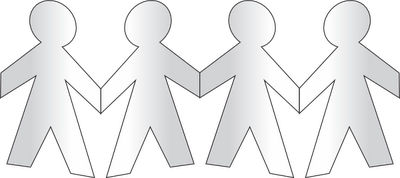
This is perhaps one of the most unalienable truths of not only the human race, but ALL species of all things on this planet and probably all planets: we need each other. We do. Even the lone hunters in the wild depend on others for survival. Everything is connected through a web so complex that no one can truly decipher it. Except maybe that kid on that show Touch, but that's beside the point. And so goes the famous quote, "No man is an island entire of itself." Damned be any creature that has evolved to a point where it believes it can not only survive wholly on its own, but actually prosper.
I don't get political here, and I have no intention of starting. This is not a political issue. It's a human one. It's a "if you disagree with the above paragraph, then you and I don't have much in common" one. In fact, I doubt you have much in common with anybody, even the ones who are currently lying through their teeth when they say that they and they alone are responsible for their lot in life. Stop deluding yourself with sound bytes and neat pictures on Facebook with out of context quotes on them that now seem to have replaced actual wisdom and introspection, and think about it. REALLY think. Do you honestly think you've done everything on your own? Really?
Well, you didn't. None of us did. Somewhere along your climb, someone tossed you some rope. Probably a lot of it. You will toss that same rope to someone else, and so on and so forth. I would not be a writer had I not been inspired by the writers before me. I wouldn't have tools to write had someone not invented pencils, paper, typewriters, and later computer chips. I would not have a book coming out if not for the company of editors and designers who are working to get it all together. They would not be publishers if not for all the readers. I wouldn't have a self-publishing business (and I'd be short a LOT of friends and colleagues) if not for the internet and all of the inventive commerce that has made my job possible. And the readers, of course, who wouldn't have discovered me if not for the power of the internet. And there wouldn't be readers without teachers. There wouldn't be teachers without MORE teachers.
ALL of this--everything you're watching and learning as you surf page after page of information from Wikipedia to YouTube and everything in between--is made possible by the tireless working hours and huge investments from millions of people and even (gasp!) the government. Yeah, I said the Big G Word.
And isn't that AWESOME? WE built this world! Together! We built the skyscrapers, the airplanes, the spaceships, the satellites, the cars, the dams, the medicines, the phones, the lightbulbs--all of it together. The internet is probably the complete masterpiece collection of human thought and ingenuity. It took money and smarts, yes, but above all it took UNITY. And people right now are using this brilliant and beautiful thing, this human cosmos and testament to what we are capable of as a species, to crap all over the concept that made it all possible. It's an irony that I find nothing short of tragic.
But this isn't just about our stations in life. Our careers and businesses. It's about who we are to the core. Other people help shape the direction of our lives. If I was alone, left entirely to my own devices, I believe I would probably become a shut-in hermit on par with Howard Hughes. Maybe I wouldn't be peeing into bottles, but I sense in myself something very close to that kind of solitary darkness, because that is the extreme end of my innate introversion. I would live in a locked up fortress with movies playing 24/7 as I wrote and smoked cigarettes and ate whatever I wanted until I died. THAT is my darkest end point as a human being. Imagine yours. And imagine how easy it would be to retreat there if it weren't for the people in your life coaxing you away from it without even trying. My kids, my parents, my husband, my friends, my colleagues -- they keep me from that place by forcing me to talk and interact. Without them, I would be a sad little recluse and probably half out of my mind.
So it's things like this I think people need to be honest and open about before they start parroting the "I-I-I-I" and "Me-Me-Me-Me" of modern culture and believing in the delusion that individual humans are self-powered and self-sustaining, that they built everything they have and everything they've accomplished themselves, that they're "self-made". Because if we don't, it will come to the detriment to all of us.
Social networking has become more a part our lives than it ever has, and yet we've become so much more egocentric. It's a strange dichotomy, and a disturbing and destructive one, because I don't know about you, but I don't want to see what lies at the end of the dark path of stringent individualism. To me, I see a plant that has stopped growing, its roots stunted and no longer branching off of one another, its leaves furling and turning yellow and finally into dust. We use the word society a lot. Its roots tell of community, of order, of organization. It's a network, a way that we bind together for the survival of all. Are we watching the death of society? Or social order? Of the way our species has lived since the beginning of its existence?
What's waiting for us when we stop moving and growing together? My imagination loves to drum up very dark things, but even I'm reluctant to go there.
I'm going to be perfectly honest: I might have carved out a name for this blog and I'm supplying it with the words you're currently reading, but I didn't build it. A large army of people who can read and write in a language I will never learn (and hopefully will never have to) did. I am so very grateful for these people, because they have made my life the way it is now possible. Instead of cheapening the accomplishments of all those who helped us get where we are, how about we all turn to one another and just say "thanks."
Published on August 02, 2012 10:25
July 31, 2012
How Publishing Works: A Short and Likely Inaccurate FAQ for a Writer's Friends and Family
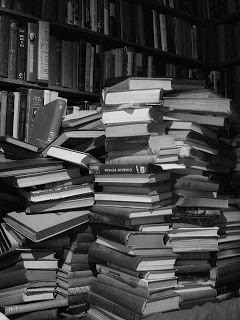
Photo courtesy of austinevan at Flikr
Most people don't know how the publishing industry works, and that's okay. Unless you're an author or someone invested in the process of getting books into the hands of readers, you really shouldn't be expected to know the particulars, anymore than I should be expected to know the whole process involved in getting a PhD or how to rebuild a transmission. But a lot of writers, self included, sometimes speak industry jargon ("I queried some agents today and just subbed a partial!") as if the uninitiated will understand, and that's never helpful for anybody.
I've been asked a lot of questions by friends and family over the years about how a book gets into their hands, and I've picked out a few of the most common ones to answer below. Maybe this will save you from a lengthy discussion of your own, or maybe you'll learn something as well. Or maybe your experience will differ and you'll want to provide your own feedback in the comments section. Either way, I hope this post is helpful in clearing up some of the perceptions people may have about you when you tell them what you do for a living.
1. What happens when you finish a book or a short story?
After it goes through a series of edits and rewrites and is ready to go out into the world, I will either make a decision to publish it myself or use more traditional means, like finding an actual publisher. My short stories are usually self-published these days because they serve as billboards for my name and my "brand," if you will. I also have a little business to sustain and its a good and quick way to get my work out to people and make a couple bucks in the process. The traditional short story market has become harder and harder to break into every year, and many publishers do not have the circulation or the resources to get your work in front of a lot of readers, or even pay you in many cases. This means the competition to get into one of the few remaining big publications is stiffer than ever. I spent a lot of years cycling my short stories through various magazines, and it's a very long and drawn out process that produces very few results. I found this to be frustrating. Now, some people do really well at it. If you can have at least a half dozen stories in circulation at any given time, it can really pay off and it's still a good way to build a name for yourself, get into some of the big writing organizations, and bring in fans from various places. But I don't write enough short stories to make that approach feasible. I'd rather have readers reading my work as soon as possible, and e-publishing short stories through Amazon and other stores has become a very viable way to make that happen.
Novels are different. No one will ever sustain a living off of short story income alone these days. Novels represent the bulk of a writer's work, blood, sweat, and tears, this is where the real meat of our income will happen. Even though self-publishing is a viable and fast option that can generate a few dollars if we're lucky, the best way to get to the top is still through traditional publishers--a company of people who read submitted work and then, if accepted, will do the printing, artwork, distribution, and publicity necessary to bring in more readers. In this case, I will usually go through a querying process either with agents or with publishers who take unsolicited submissions.
2. Whoa whoa whoa... You're doing that jargon thing again. What is an agent, and what is an unsolicited submission?
An agent is someone who represents the author and his or her work. They act as advocates and intermediaries between author and publisher, and finding one who will take on a new writer is also a very frustrating and lengthy process, because we essentially have to "audition" by sending in a query letter (this is essentially the sales pitch for our book) and sample pages. If they like us and think they can sell our book to a publisher, they may take us on (these are very big ifs, because there are far more authors than there are agents to represent them, and they reject tons of great writers every day). From then, they will submit our work to the big publishers. This is called a "solicited submission," and all but a few of the major New York publishers require them. And if the agent manages to sell the book, they will negotiate the contracts and basically work on our behalf to make sure we're getting the best deal, all in exchange for 15% of the receipts.
An unsolicited submission means the author submits the work themselves, sans agent, and there aren't many big publishers who will take these. Tor is one I can think of off-hand, but there may be a couple others. Most times, it's the smaller and mid-sized presses who will take submissions directly from authors. For instance, my publisher Hobbes End is a smaller press who didn't require an agent to submit, and there are many more out there.
So if you wonder why any of your writer friends and family can't just send their work to Random House or one of those other big New York publishers, it's because it would be a complete waste of time and resources. Unless your friend or family member has an agent, or knows someone who knows an editor at said publishing house, they can pretty much forget about it it.
3. How much money will you make when your book is published?
I read a sad statistic recently that half of all self-published authors make less than $500 a year. So that ought to tell you something. I am lucky to not be in that bottom percentile right now, but I'm still not able to pay the rent on my earnings. As for traditionally published books, the money is anyone's best guess, but the odds are not in anyone's favor that they will be the next Stephen King or James Patterson or Stephenie Meyer. Getting into that league requires a certain amount of luck and destiny, and unless we're one of the lucky few whose book is sucked up into the zeigeist, we will not likely be able to quit our day jobs with the earnings of one book alone. A lot of big publishers will advance an author anywhere from a couple thousand to several thousand dollars (and upwards into the millions if we're talking about a celebrity) against future earnings. Then, after they've sold beyond the amount of the advance, they start getting royalties checks. Most debut authors with big publishers won't get much of an advance, if they get one at all. Usually it's between $0 and $5000, but it's all decided by their number crunchers and how much they can expect your book to earn after running it through their fancy algorithms.
Small publishers usually don't offer advances, but just royalties on sales. Royalties are a percentage of each book sold, and they are paid either monthly or quarterly. Yes, if you have a career as an author (like a lot of entertainers), your paychecks will either come once a month or every few months. And you'll have to figure out your own taxes.
Many authors can expect to make anywhere from a few cents to a couple bucks off each print sale (lets just say 10% for the sake of easy math, but it can fluctuate between 8 and 15%), but this is dependent on several factors. For instance, Amazon, the world's largest bookseller, will lop about 50% off the cover price before they will even carry it. This means that a publisher who is listing a book for a retail price of $10 will only get $5 when they sell through Amazon. And then the author's cut is 10% of that, or fifty cents. Again, this number can vary somewhat, but that's the gist of how it works, at least through one retailer, but it's similar for everyone. Then there are ebook royalty rates, which are generally much higher (around 40%). If movie and foreign rights are sold, or if a bigger publisher buys the rights from a smaller publisher, there is potential for more money, of course, but those are also big ifs. To simplify it all, most debut or mid-list authors will be lucky to earn out their advances, and if they do, they probably won't get much beyond that unless it turns into a major success. In other words, a whole year (or decade, depending) of work may only net an author five grand. Or less. Much less.
The only way authors make good and sustainable income is if they write a lot of books. A pittance for one book becomes several pittances for several books, which then becomes decent money. That is unless the book sells so poorly on debut that the publisher takes the book out of print and dumps the author like the dead weight they've become.
4. When you get published, will I be able to go into a bookstore or library and find your book?
Without getting into the particulars of book distribution and such, I'll just say "maybe." In many cases, no. It costs publishers a lot of money to print books. It costs them even more to purchase shelf space for those books all over the country, and unless the book is a prominent release and a guaranteed big sell (see: books you usually find on those big displays in the front of the store), you aren't going to be as likely to see your friend's book in a chain bookstore like Barnes & Noble. And with the fall of Borders, the industry lost a LOT of shelf space, which means it probably comes at an even higher premium now. But that's not to say it CAN'T happen. Publishers employ sales people for this reason--to go out and work with distributors and retailers to get their company's books into their stores. If the book is self-published, though, you're even less likely to find it on any shelf, unless the author has worked with independent bookstores who are more flexible. That being said, most publishers should have all of their books on distribution lists, which means you could conceivably walk into a Barnes & Noble and go to the customer service counter and ask them to order the book for you.
However, as authors in today's hostile climate, we've been forced to adjust our definitions of success quite a bit. Winding up on a big bookstore shelf is great for the ego, but it doesn't always mean the book will sell. Most titles will sit on the shelf for a specified period of time--say six weeks or so--then they will be taken down and shipped back to the distributor or publisher, where they will most likely be destroyed or sold off in some kind of fire sale so that they can recoup their costs. If more of an author's books are being destroyed than sold, they will likely be dropped by their publisher, and quite possibly their agent. After all, they're not getting paid if the book doesn't sell, and there is no shortage of writers out there eager to take that spot. With online stores being the main draw these days, it's a lot easier for a publisher to move an inventory of books, even though the publisher (and the author) isn't making as much money. So it's a double-edged sword, and most writers have to find a balance between a happy ego and a happy bank account. As for the library, if enough people request that a library carry a book, they may just put in an order for it. So it's not so simple as "publish book, be in bookstore." The bottom line is the bigger your publishing agreement, the bigger the risk the publisher has taken on you, and that means the more you must sell. It's a very scary thing in many ways.
5. How long does it take for your book to get published after they accept it?
The bowels of the publishing industry are long and slow. With few exceptions, a piece of work accepted by a publisher today will most likely be up for sale anywhere from a year to eighteen months from now, on average. It could even be up to two years. Publishers only release so many books per calendar year, and there is a long editorial process, followed by generating marketing plans, doing cover art, working deals with distributors, securing advance reviews, etc. It's a process not at all unlike making a film. Even in the modern age, patience is the most important virtue any author can have. Unless you self-publish. Of course, then your patience has to switch gears from being about anticipating the release to waiting for sales to increase. Anyone who is impatient about things happening immediately probably shouldn't be an author.
There is a lot more I could go into here about the industry, but those are the basics and the questions I hear most often from people when they learn I'm a writer. I am often amused and flattered when people think there is a lot of prestige associated with it, because I guess it just feels like a very unglamorous profession. Athletes, singers, and actors have to push their bodies to the limit and assume great interruptions to their lives and get up in front of thousands of people on a regular basis in order to do what they do. It's hard not to feel a little bit like a dope when you do most of your work in your pajamas behind closed doors, only to emerge for a little bit to go to book signings and then go back into solitary confinement to write the next book.
A lot of my own perceptions have been altered and/or shattered since I entered this business a number of years ago. It's changed a lot since my own literary heroes got their big breaks. Gone are the days when the agents used to court the authors, and you could get your deal directly from the big New York players all on your own. It's a lot harder to break into this business and make a name for oneself, and it's often full of disappointment and anxiety and tiny bouts of depression, but like sports and movies and music, there is a lot of reward in the doing part of things, which I guess is why we keep at it.
Published on July 31, 2012 10:36
July 23, 2012
Goodbye Belly Shelf
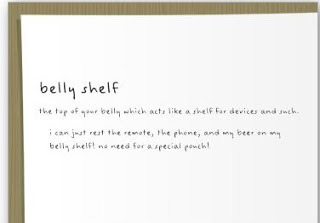
When you're fat, you might think everything about it is inconvenient. And generally, it is. Flying, for instance, really sucks. Then there is the whole trying to find clothes that fit right thing, the not having as much athletic endurance as you'd like thing, the inability to tolerate heat thing, the swelling ankles thing, the not being able to bend over and tie your shoes as easily as a skinny person thing. If you can think of a physical inconvenience, I'm pretty sure a fat person (even a happy fat person) has experienced it. We've just learned how to live with these facts of life.
But it's not all bad. I mean, at least you have the "shelf." You know, that plane of flesh that forms in front of you when you sit down that can become anything you like, from a built-in armrest to a cup or plate holder, a book support, that thing you can prop a baby on? Most women have them when they're pregnant, and a lot of us keep them years after we have our babies, like a souvenir. The belly shelf is like one of those things you might expect to see Billy Mays plugging in a late night infomercial as something you'd strap on and enjoy with your Snuggie.
While the shelf can be handy, I think I could do with out it, because there is this other other shelf our bodies automatically provide for us called a "lap." But if you're fat, then you might have noticed that there is limited real estate on said lap. In the meantime, my shelf is disappearing and honestly can't even rightly be called a shelf anymore. In fact, it's about half the size it was two weeks ago (maybe that makes it a pudgy form of crown molding?), all because I stopped eating crap and started eating good stuff (see the Vegan Thing and the Vegan Thing Part II). Again, I'm not counting calories, and I'm not even really exercising (yet), but I've cut out added oils and sugars, dairy (still having the occasional bit of cheese, but that's it), no eggs, no meat (chicken, pork, beef). Also no sodas or artificially sweetened beverages of any kind. It's either water or unsweetened iced tea. I eat lots or veggies (starchy and non-starchy alike), fruits, nuts, grains (rice, oats, pasta, quinoa, barley, bread), and beans. Yeah, that's a lot of carbs, and you know what? My body is perfectly happy and my blood sugar is lower than it's ever been, so Dr. Atkins, if he were still alive, would receive an invitation to kiss my ever-shrinking ass. If you want more information on the style of eating we're doing, I recommend The Starch Solution by Dr. John McDougall.
The belly shelf has disappeared and come back a lot of times over the years, but I have to say, I don't think it's ever disappeared this quickly before. Even when I was doing Medifast and taking in about 900 calories a day, I don't think my belly shrank at this rate. In fact, the fat in my belly has been the most stubborn since I put on a good bit of weight there after having kids. Even when I've lost large chunks of weight over the years since (Weight Watchers, South Beach Diet, Medifast, etc etc), I've been lucky to drop more than one or two pants sizes because of my stupid stomach. Now it seems like this is the first place it's leaving, and, well... I'm shocked.
But don't worry. I'm not complaining about the loss of such an important utility device. The shelf has been there with me for so long I scarcely know what to do with myself in its gradually increasing absence. I find myself hugging pillows as I sit on the couch trying to mimic what was once there, because I honestly don't know how to sit without having a big mass of flesh in front of me. I'm going to have to relearn how to be comfortable in my own skin as its shape changes.
If you're not fat or never have been fat, you're probably reading this and wondering how in the hell you can relate. Well, we all adapt to the bodies we have, I guess. If we don't, then imagine how much more miserable we would be.
But for now, don't ask me to hold your baby, because I'm not quite sure I would know how to just yet.
Published on July 23, 2012 11:35
July 19, 2012
There Are No GR Bullies, Only Whiny Authors
 Fellow Indie Authors,
Fellow Indie Authors,There is a small but annoyingly vocal faction of peers in our midst. I'm of course talking about the Whiny Author Horde (a.k.a. WAH).
Please be careful associating with any members of WAH, for their butthurt of entitlement is known to be both contagious and career-destroying. The website, Stop the GR Bullies, is but one of their hideouts. That one is dedicated to lashing out at members of GoodReads who are really mean (i.e. post negative reviews of books), but rest assured they're lurking everywhere, waiting to jump on any negative review in order to protect their livelihoods. You may notice that you can't do both of those things at the same time, but don't worry. That only means you're still behaving rationally, and this is a good thing.
The best way to avoid being caught up in the WAH hysteria, or if you truly do feel like you may become the victim of a so-called bully reviewer and want to do something about it, is to read this list of protective measures:
1. If you receive a negative review, KEEP YOUR MOUTH SHUT.
2. If you receive a negative review, KEEP YOUR MOUTH SHUT.
3. If you have written a book and put it up for sale in the public marketplace, accept the possibility that you could receive negative reviews. Even really mean negative reviews that don't seem fair at all and might possibly affect your sales. That's part of the business of being a public entertainer.
4. If you receive a negative review, KEEP YOUR MOUTH SHUT.
There. I hope that helps. Again, I know it seems tempting to join the ranks of WAH, especially if you're getting a spate of bad reviews lately. The instinct to protect your reputation is obviously very high. You don't want to be made a fool of in public. No one does. And bad reviews are indeed quite embarrassing. But what's MORE embarrassing than a bad review is an author who does not know how to take criticism like a professional. That, along with legions of internet denizens just waiting to do a Print Screen on an impending Author Melt will destroy your career more than any scathing one-star Amazon or GoodReads review. It isn't your job to defend your work. Let your fans do that, if they feel so inclined. And if you say, "But I don't have any fans!"
Well... do you really think duking it out with a stranger on the internet is going to accomplish that for you?
Obviously, the internet is full of trolls, and there may even be several of them on GoodReads. I was recently informed about a user there being investigated for suspicious activity that involved leaving one-star reviews for hundreds of indie authors while giving five-star reviews to Big 6 authors. But that was something that was handled quietly. No one got up in this user's face and confronted her (that I noticed). If you see something suspicious like that, certainly let the powers that be know about it. They may not be able to do anything, but it's a better action to take than engaging in public dumbfuckery that will scare away honest readers.
We all hate getting bad reviews. We may even complain to our friends about them in order to soothe the burn a little. But let it end there. Go eat some ice cream. Go hug a homeless person or pet a kitten. Get drunk or smoke a doob. Do whatever it is you do to relieve stress. Then ask yourself whether your desire to avoid embarrassment is greater than your desire to create and sell your work. If so, you might want to take up another less public mantle of self-expression. Like clog dancing or basket weaving.
Just remember. There are no "GR Bullies." By following this advice, you'll not only protect your reputation, but the reputations of those of us who would rather not be associated with WAH.
Sincerely,
A-Dawg
Published on July 19, 2012 09:43
July 13, 2012
The Vegan Thing Part II
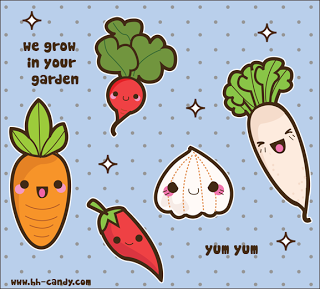
No meat. No dairy. No eggs. Very little added oil.
That's been the deal for the last six days or so. My husband has hopped right on this bandwagon with me, and the kids have also been enjoying our revamped meals, although I still allow them to have eggs and cheese.
We've been eating a lot of soups, grains, beans, nuts, seeds, and of course fruits and vegetables. It's taken some adjusting, at least for Ken. Before this, his breakfasts have been either unhealthy or sporadic, and he hadn't been bringing in his own lunch, so we're changing all that. I think we're getting there, though. Eating this way takes a little planning to a certain extent. You have to have foods prepared and ready to go if you hope to maintain the convenience of the otherwise typical diet and avoid the temptation to eat out. I'm making our own breads and nut-based milk substitutes. Also making ahead breakfast (usually oats soaked overnight with mashed banana, chia seeds, and cashew milk). Chia seeds are my best friends right now. They really fill you up, and they're excellent for you. Even better for you than flax seeds.
But overall, meal preparation has been VERY simple. I also truly truly enjoy not having to handle meat when I cook. Sure, I love eating meat, but it's nice not having to worry as much about things like cross-contamination or making sure shit's cooked all the way through so it doesn't accidentally make someone ill for a week.
Having fresh vegetables from my mom's garden has helped. Also, I plan to take good advantage of any deals I can score at farmer's markets this weekend. The meal prep isn't that much different than before. Three or four "big pot" meals (soups and stews and grain-based salads mostly) that can be eaten for meals throughout the week. Maybe a hearty pasta dish or stir-fry to round things out. Fruits, veggies, and nuts for snacks. Again, simple stuff. There is this impression some people have that this kind of diet is difficult to maintain or do because you have to buy all these crazy ingredients, cook a ton of food, or eat all these weird protein substitutes, and take a ton of supplements, etc.
Sure, I could spend a ton of money on cheese substitutes, egg replacers, and fake meat, but I'd prefer not to. Soak some flax or chia in a couple tablespoons of water, and there's your egg (for baking and binding, anyway). Fake meat products are highly processed and I can't see enjoying more than the very occasional frozen veggie burger now and then, especially when recipes for homemade ones made from beans are so easy, good for you, and probably taste a million times better. As for fake cheese, there are some things I'm thinking of trying. I bought some nutritional yeast, which apparently can be used to mimic the flavor of cheese in certain dishes, but I'm not really dead set on doing it right this second. The truth is, I'm not craving cheese or milk. I haven't for a long time. I'm also not entirely against a sprinkle of aged parmesan cheese if I must absolutely have it on something, like my pesto.
So I guess the real question is, how have I been feeling in even this short time?
The quick answer is: AWESOME. Here's a list of the effects I've noticed in just a few days:
My mood has been very level and serene. My mental fog feels like it's begun to lift, and I'm able to focus on my work better than ever.
I feel lighter and ready to move around after I eat, as opposed to feeling sluggish and in need of a nap.
I have not had a single digestive upset issue following any meal. This is major, because this is was a near daily thing for me.
I'm dropping a lot of water I've been retaining (peeing a LOT, TMI), and my ankles are completely normal size. I can also sit at my desk for long periods of time without them ballooning back up.
Over the last two days, my asthma/chronic nighttime wheeze is really starting to improve, and I'm not having a single incidence of heartburn/reflux for the first time in months. As a result, I'm sleeping MUCH better. I'm pretty positive the reflux and the asthma were linked.
I don't know if I've lost weight, as I don't plan on stepping on a scale anytime soon, but I'm sure I'll start noticing those changes at some point. I'm also looking forward to seeing how it affects my psoriasis, but the inflammation seems to be less than usual.
Am I craving anything? Somewhat. My brain and mouth miss meat, but my stomach and intestines don't. The hard part will be not saying, "Hey, how 'bout a cheeseburger" when the memory of my digestive issues starts to fade, but hopefully the additional benefits will be enough to keep it going, because I truly just do not want to go back to the way I was doing things. This diet is actually too damn easy to allow that to happen. I'm not counting calories or weighing/measuring out portions. I don't really feel deprived, because I can still have the foods I truly love, like fruits and grains. There are a ton of tasty sweet treats that I can whip up in the ol' Vitamix. And if I absolutely must eat an animal of some kind, I'll go get a great piece of fish, and we'll make a night of it.
I highly HIGHLY recommend Pinterest for searching recipes. Lots of great vegan pinboards on there full of food that looks absolutely delicious, and I can't wait to try them all. The website Oh She Glows (and its accompanying Pinterest board) has been a fantastic help so far, but there are quite literally a TON of food blogs out there that you can scour for these kinds of recipes.
If anyone has any questions or suggestions, I'm happy to discuss in the comments!
Oh, and a quick note. Took the kids out for lunch today at the local market. There were all sorts of food options available to them, and I was letting them have free pick of whatever they wanted. They opt for the salad bar. #Awesome.
Published on July 13, 2012 13:09



